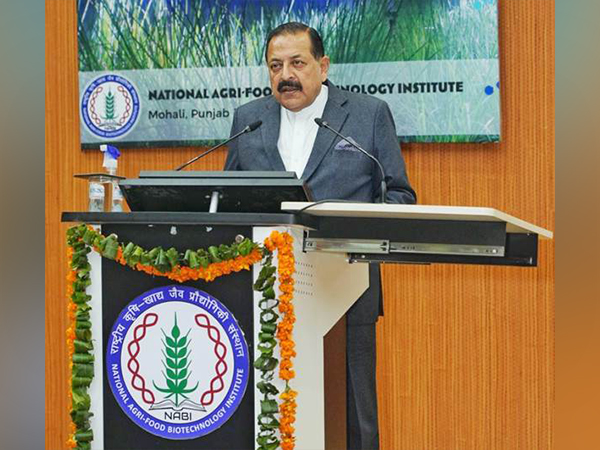Dr Jitendra Singh, Union Minister of Science and Technology, today inaugurated the groundbreaking ‘National Speed Breeding Crop Facility’ at the National Agri-Food Biotechnology Institute (NABI) in Mohali, marking a significant leap forward in agricultural innovation and crop development.
According to a press release by the Ministry of Science and Technology, in his address at the inauguration ceremony, Minister Singh emphasized the initiative’s alignment with Prime Minister Narendra Modi’s vision of doubling farmers’ income, ensuring their economic empowerment, and promoting agri-startups.
He expressed confidence that the facility would empower farmers to improve the quality and quantity of their crops significantly.
Minister Singh said, “Biotechnology speedy seeds facility will cater to all the States of India but it will especially be useful for the North Indian States like Punjab, Himachal Pradesh, Haryana and the UT of J&K.
Adding further he said, “this facility will augment transformational changes in crop improvement programmes by accelerating the development of advanced crop varieties that could sustain climate change and contribute to the food and nutritional demand of the population with implementation of speed breeding cropping methods”.
The Minister said, “Direct Benefit Transfer (DBT) institute of NABI has developed technology of ‘Climate- resistant crops’, by harnessing these technologies the farmers will not be restrained to cultivate a crop in a particular season rather they will have the liberty to practise farming irrespective of climate conduciveness”.
Minister Singh, while highlighting the recent achievements of institutes under the Ministry of Science and Technology, said, “Our institutes have specialised technologies in fruit, flowers and crop cultivation through modern genetic means”.
He recalled the success of ‘Tulip’ Cultivation by Council of Scientific and Industrial Research (CSIR) Palampur, he also recalled the development of ‘108-petal lotus’ by CSIR Lucknow which won an award in the TV series Kon banega Crorepati (KBC).
He further emphasised that application of latest technology in the farming sector will add to the economic growth of the country by supplementing modern Science and Technology tools to the traditional vocation of farming in India, read the press release
“Bio-manufacturing and Bio-foundry will drive India’s future bio-economy and promote Green Growth”, said Minister Singh.
According to him, the Ministry is working with a synergy and integrative approach keeping in view the emphasis of PM Modi on combining Science and Technology with traditional knowledge to supplement India’s economy, read the press release.
Dr. Jitendra Singh also highlighted the fact that under PM Modi “India’s bio-economy has grown 13 folds in the last 10 years from USD 10 billion in 2014 to over USD 130 billion in 2024”.
Addressing the inauguration Dr Singh said, “In the 3rd consecutive term of Prime Minister Narendra Modi, India has been projected to emerge as the 3rd largest economy of the world and rise to be the largest in coming years. Contribution of the agriculture sector will therefore be crucial for the Indian economy”.
Dr Jitendra Singh informed that the Modi Government is conscious of the importance of Bio-economy and thus the recent ‘Vote of Account-Budget’ had a provision for a special scheme for Bio-manufacturing.
According to Dr Jitendra Singh, institutes like NABI will have an important role to enable the transformational progress and value addition in farming sector productivity, read the press release.
The facility will directly help a) Scientists and Researchers from government institutions, private institutions and leading industries in India engaged in agricultural and biotechnology research and development of improved crop varieties and products, b) Plant Breeders working for crop development and c) Progressive farmers who are contributing to adoption of new varieties with superior yield and nutritional traits.
In his address, Prof Ashwani Pareek, Executive Director, NABI, said the speed breeding crop facility will be used to develop new varieties such as wheat, rice, soybean, pea, tomato, etc., by using a precisely controlled environment (light, humidity, temperature) to achieve more than four generations of a crop per year.
The NABI institute has significantly contributed to ‘Atal Jai Anusandhan Biotech (UNaTI) Mission (Poshan Abhiyan), and Biotech Kisan Hubs for Jammu & Kashmir, Ladakh, Himachal Pradesh, Punjab, Haryana etc, he said. (ANI)



